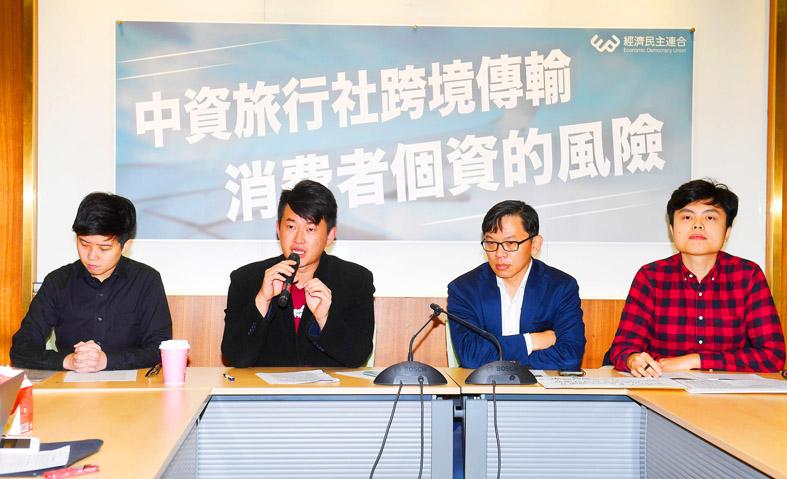The Economic Democracy Union yesterday accused travel agency ezTravel of maintaining ties to Chinese government agencies and receiving funding from Beijing in exchange for leaking customer data.
EzTravel is effectively controlled by Singapore-based Trip.com, union secretary-general Chiang Min-yen (江旻諺) told a news conference at the Legislative Yuan.
“While all nine members on Trip.com’s board of directors are Chinese, two of them also serves as consultative members to the Chinese Communist Party,” Chiang said, adding that Eztravel’s ties to Trip.com might contravene Taiwanese law.

Photo: CNA
Three members on ezTravel’s board of directors are Chinese, he said, adding that “they would probably pass on personal information of Taiwanese travelers to the Chinese government, if Beijing demands it.”
Although it might not be clear if ezTravel or its board members contravene the law, it is worrying that the company disregards Taiwanese rights to privacy, Taiwan Statebuilding Party Legislator Chen Po-wei (陳柏惟) said, adding that the Tourism Bureau should lead an investigation into the company and who controls it.
As ezTravel is registered in Taipei, the city government should inform the public if it had knowledge of Chinese influence on the company, Taipei City Councilor Miao Po-ya (苗博雅) said, adding that the city should consider revoking its business license.
EzTravel chairman Chen Fu-yen (陳甫彥) refuted the allegations, saying that none of the three foreign members on the company’s board are Chinese.
Chiang and lawmakers said that the three board members might be Chinese nationals who have obtained naturalized citizenship in other countries for the purpose of doing business in Taiwan.

Alain Robert, known as the "French Spider-Man," praised Alex Honnold as exceptionally well-prepared after the US climber completed a free solo ascent of Taipei 101 yesterday. Robert said Honnold's ascent of the 508m-tall skyscraper in just more than one-and-a-half hours without using safety ropes or equipment was a remarkable achievement. "This is my life," he said in an interview conducted in French, adding that he liked the feeling of being "on the edge of danger." The 63-year-old Frenchman climbed Taipei 101 using ropes in December 2004, taking about four hours to reach the top. On a one-to-10 scale of difficulty, Robert said Taipei 101

Nipah virus infection is to be officially listed as a category 5 notifiable infectious disease in Taiwan in March, while clinical treatment guidelines are being formulated, the Centers for Disease Control (CDC) said yesterday. With Nipah infections being reported in other countries and considering its relatively high fatality rate, the centers on Jan. 16 announced that it would be listed as a notifiable infectious disease to bolster the nation’s systematic early warning system and increase public awareness, the CDC said. Bangladesh reported four fatal cases last year in separate districts, with three linked to raw date palm sap consumption, CDC Epidemic Intelligence

US climber Alex Honnold left Taiwan this morning a day after completing a free-solo ascent of Taipei 101, a feat that drew cheers from onlookers and gained widespread international attention. Honnold yesterday scaled the 101-story skyscraper without a rope or safety harness. The climb — the highest urban free-solo ascent ever attempted — took just more than 90 minutes and was streamed live on Netflix. It was covered by major international news outlets including CNN, the New York Times, the Guardian and the Wall Street Journal. As Honnold prepared to leave Taiwan today, he attracted a crowd when he and his wife, Sanni,

Taiwanese and US defense groups are collaborating to introduce deployable, semi-autonomous manufacturing systems for drones and components in a boost to the nation’s supply chain resilience. Taiwan’s G-Tech Optroelectronics Corp subsidiary GTOC and the US’ Aerkomm Inc on Friday announced an agreement with fellow US-based Firestorm Lab to adopt the latter’s xCell, a technology featuring 3D printers fitted in 6.1m container units. The systems enable aerial platforms and parts to be produced in high volumes from dispersed nodes capable of rapid redeployment, to minimize the risk of enemy strikes and to meet field requirements, they said. Firestorm chief technology officer Ian Muceus said